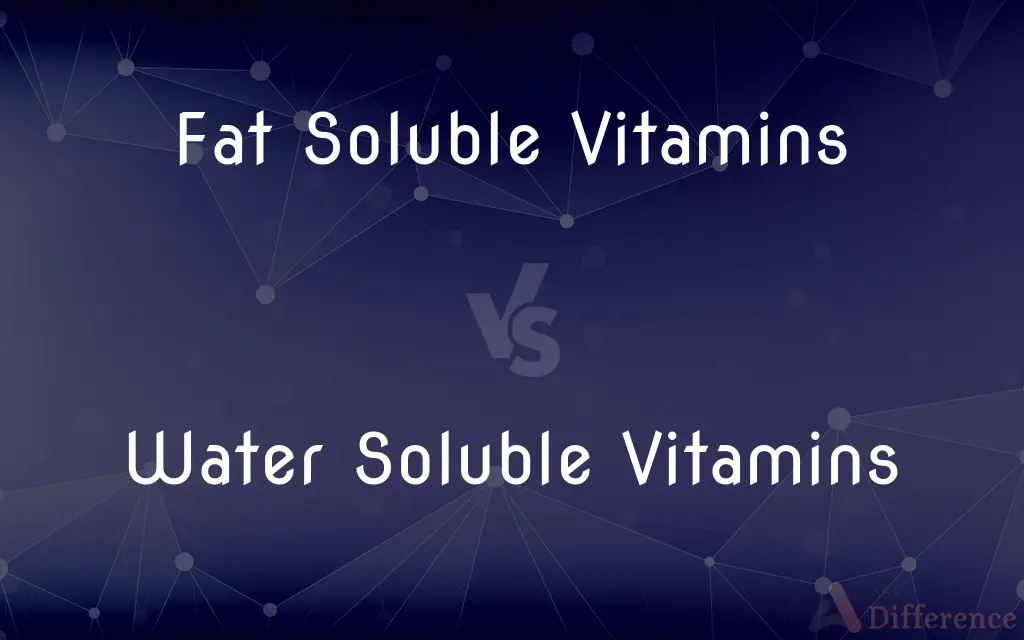Fat Soluble Vitamins vs. Water Soluble Vitamins — What's the Difference?
By Urooj Arif & Fiza Rafique — Published on March 1, 2024
Fat-soluble vitamins (A, D, E, K) are stored in the body's fatty tissues and liver, requiring fat for absorption, while water-soluble vitamins (B-complex and C) dissolve in water, need regular replenishment, and excess amounts are excreted in urine.

Difference Between Fat Soluble Vitamins and Water Soluble Vitamins
Table of Contents
ADVERTISEMENT
Key Differences
Vitamins are essential nutrients the body needs to function correctly, classified based on their solubility into fat-soluble and water-soluble vitamins. This classification affects how each vitamin is absorbed, transported, stored, and excreted by the body.
Fat-soluble vitamins include vitamins A, D, E, and K. They are absorbed through the intestinal tract with the help of fats. Because they are stored in the body's fatty tissues and the liver, fat-soluble vitamins do not need to be consumed daily, and excess intake can accumulate, potentially leading to toxicity. These vitamins play crucial roles in vision, bone health, coagulation, and protection against oxidative damage.
Water-soluble vitamins consist of the B-complex vitamins (B1, B2, B3, B5, B6, B7, B9, B12) and vitamin C. They dissolve in water and are not stored in significant amounts in the body, requiring regular intake through the diet. Excess water-soluble vitamins are typically excreted through urine, making toxicity rare. These vitamins are vital for energy production, immune function, and the synthesis of neurotransmitters.
The body's absorption and storage efficiency, the risk of deficiency or toxicity, and the biological functions of vitamins vary significantly between these two categories. While fat-soluble vitamins can be stored for longer periods, water-soluble vitamins must be replenished more frequently to maintain health and prevent deficiencies.
Comparison Chart
Vitamins Included
A, D, E, K
B-complex (B1, B2, B3, B5, B6, B7, B9, B12), C
ADVERTISEMENT
Solubility
In fats and oils
In water
Absorption
With dietary fats, stored in body tissues
Easily absorbed, not stored in large amounts
Storage
In liver and fatty tissues
Minimal storage, excess excreted in urine
Frequency of Intake
Do not require daily intake
Need regular daily intake
Risk of Toxicity
Higher due to storage in body fat
Lower, excess usually excreted
Key Functions
Vision, bone health, clotting, antioxidant protection
Energy production, immune function, neurotransmitter synthesis
Compare with Definitions
Fat Soluble Vitamins
Vitamin K is important for blood clotting and bone metabolism.
Green leafy vegetables are rich in vitamin K.
Water Soluble Vitamins
Vitamin B12 (Cobalamin), necessary for red blood cell formation and neurological function.
Vitamin B12 is predominantly found in animal products like meat.
Fat Soluble Vitamins
Vitamin E acts as an antioxidant, protecting cells from damage.
Almonds are a good source of vitamin E.
Water Soluble Vitamins
Vitamin B1 (Thiamine), aids in energy metabolism and nerve function.
Whole grains are a primary source of thiamine.
Fat Soluble Vitamins
Vitamin D is crucial for bone health and calcium absorption.
Sun exposure helps the body synthesize vitamin D.
Water Soluble Vitamins
Vitamin C supports immune health and collagen synthesis.
Oranges and other citrus fruits are high in vitamin C.
Fat Soluble Vitamins
Vitamin A is essential for vision and immune function.
Carrots are high in beta-carotene, a precursor to vitamin A.
Water Soluble Vitamins
Vitamin B9 (Folic Acid) is essential for DNA synthesis and cell growth, especially important during pregnancy.
Leafy greens are loaded with folic acid.
Common Curiosities
Do cooking methods affect vitamin content in foods?
Yes, water-soluble vitamins are more likely to be lost during cooking, especially in water, whereas fat-soluble vitamins are more stable.
Can you overdose on water-soluble vitamins?
While less common than fat-soluble, excessive intake of certain water-soluble vitamins, like B6 and C, can lead to adverse effects.
What happens if you don't get enough fat-soluble vitamins?
Deficiencies can lead to health issues, such as night blindness (vitamin A deficiency), rickets (vitamin D deficiency), and increased bleeding (vitamin K deficiency).
What's the best source of dietary vitamins?
Whole foods are the best sources, providing a complex nutritional profile beyond just vitamins, including fiber and phytonutrients.
How does the body absorb fat-soluble vitamins without dietary fat?
Absorption is less efficient without dietary fat, which is why consuming these vitamins with a fat source is recommended for optimal absorption.
Can water-soluble vitamins be stored in the body at all?
While they're not stored in large amounts like fat-soluble vitamins, small quantities can be retained, particularly vitamin B12 in the liver.
How does alcohol consumption affect vitamin absorption?
Chronic alcohol consumption can lead to deficiencies in both fat-soluble and water-soluble vitamins by affecting their absorption, storage, and metabolism, particularly B vitamins and vitamin A.
Why are fat-soluble vitamins stored in the body but water-soluble ones are not?
Fat-soluble vitamins dissolve in fats and are stored in fatty tissues and the liver, whereas water-soluble vitamins dissolve in water and the excess is excreted by the kidneys.
How can I ensure I'm getting enough of both types of vitamins?
Eating a balanced diet rich in fruits, vegetables, whole grains, and lean proteins can help ensure adequate intake of both fat and water-soluble vitamins.
Why do fat-soluble vitamins lead to toxicity more easily than water-soluble vitamins?
Since fat-soluble vitamins are stored in body tissues, excessive intake accumulates over time, increasing the risk of toxicity. Water-soluble vitamins, in contrast, are excreted if taken in excess, reducing the risk.
Can fat-soluble vitamin deficiencies be corrected quickly?
Correcting deficiencies may take longer because building up bodily stores of these vitamins to adequate levels can require consistent supplementation or dietary intake over weeks to months.
Is it safe to take vitamin supplements without a doctor's advice?
It's best to consult with a healthcare provider before starting any supplement, as excessive intake can lead to toxicity, especially with fat-soluble vitamins.
How often should I consume water-soluble vitamins?
Daily, because the body does not store them in significant amounts and excretes excess through urine, requiring a consistent intake to maintain adequate levels.
Share Your Discovery

Previous Comparison
Casting Rod vs. Spinning Rod
Next Comparison
Rate Expression vs. Rate LawAuthor Spotlight
Written by
Urooj ArifUrooj is a skilled content writer at Ask Difference, known for her exceptional ability to simplify complex topics into engaging and informative content. With a passion for research and a flair for clear, concise writing, she consistently delivers articles that resonate with our diverse audience.
Co-written by
Fiza RafiqueFiza Rafique is a skilled content writer at AskDifference.com, where she meticulously refines and enhances written pieces. Drawing from her vast editorial expertise, Fiza ensures clarity, accuracy, and precision in every article. Passionate about language, she continually seeks to elevate the quality of content for readers worldwide.
















































